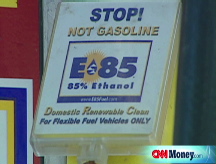Saudi Arabia to produce more oil
World's largest oil producer says it will increase daily oil production to 9.7 million barrels from 9 million in July.
JEDDAH, Saudi Arabia (CNN) -- Saudi King Abdullah confirmed Sunday that his country will increase daily oil production to 9.7 million barrels from 9 million to counter the sharp rise in international oil prices.
The Saudi petroleum minister, Ali I. Al-Naimi, said the country will reach the 9.7 million level by July. The announcement comes after Saudi officials had announced modest increases.
It would be Saudi Arabia's highest production rate since 1981.
White House Deputy Press Secretary Tony Fratto praised the step. "Any increase in production in today's oil market is welcome," Fratto. "It is important that we also take steps to increase domestic production and our refining capacity."
Al-Naimi also said the Saudi government will invest in oil projects that would allow Saudi Arabia to have the capacity to produce 12.5 million barrels per day by the end of next year.
King Abdullah's announcement came at the end of the Jeddah energy summit, where he also called for OPEC to set aside $1 billion for a strategy to ease the oil price crisis. He said $500 million should be given to developing nations to help them get the energy they need.
King Abdullah said there are "many factors that made oil prices high." Along with increased demand, he also cited oil speculators and an increase in taxes in consumer nations.
The pain of escalating oil prices - crude sold for more than $134 a barrel on Friday, double year-ago levels - have cascaded throughout the U.S. economy.
Oil has become a hot-button political issue as the cost of gasoline, diesel and jet fuel have spiked in recent months. Congress has scheduled hearings this week to debate legislation that would attempt to dampen prices.
Bodman: Don't blame speculators
On Saturday, U.S. Energy Secretary Samuel Bodman, attending the Saudi summit, attributed the record-high oil prices to lagging production.
Bodman said he did not believe speculators are the cause of high oil prices.
Since 2003, he said, global demand for oil has increased because of industry in China, India and the Middle East. But from 2005 to 2007, there was very little increase in supply.
Nations need an additional supply of energy to market, whether that energy is nuclear, coal, fossil fuels, solar or wind power, Bodman said.
"We spent 30 years digging ourselves into this hole," Bodman said. "It won't be solved soon."
World leaders address supply and demand
British Prime Minister Gordon Brown and Chinese Vice President Xi Jinping both said during speeches at the summit Sunday that their countries need to find ways to bolster production of alternative forms of energy.
"The high price in increases of oil has affected the international economy and has brought tension in the international community," Xi said.
Earlier in the week, President Bush asked Congress to permit drilling for oil in deep water off America's coasts to combat rising oil and gas prices.
"There is no excuse for delay," the president said Wednesday.
Bush also renewed his request that Congress allow drilling in Alaska's Arctic National Wildlife Refuge, or ANWR, clear the way for more refineries and encourage efforts to recover oil from shale in areas such as the Green River Basin of Colorado, Utah and Wyoming.



